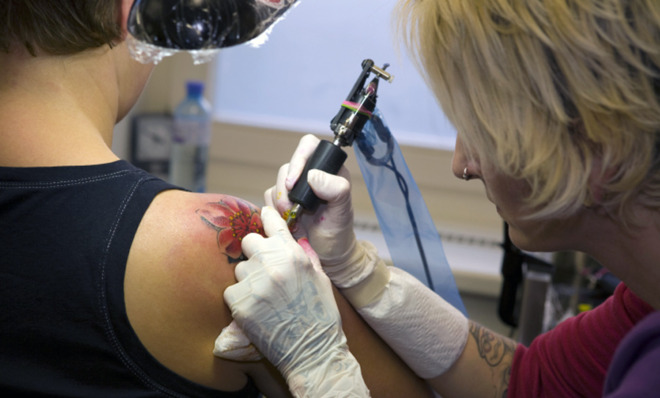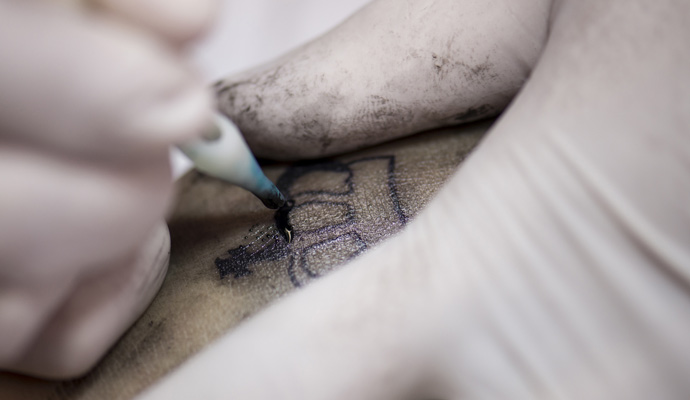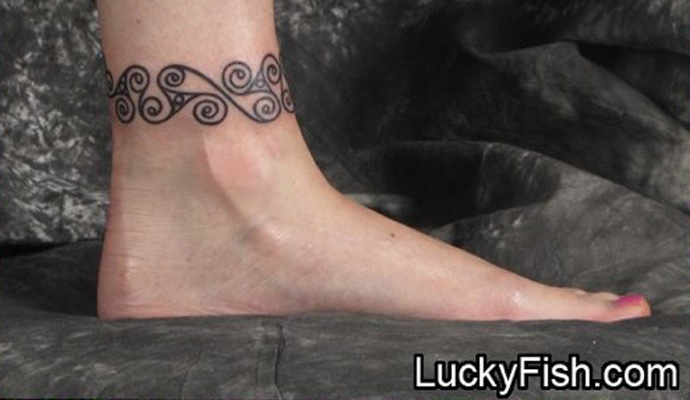A common sense guide to your first tattoo
About to pick a personal logo for life? Read this before you go under the needle.


So you're a "blank" who's never gone under the needle, and you think you're ready to be embellished with a little ink. But that ink is permanent, and you have a few questions.
Well, we asked world-renowned tattoo artist Pat Fish of LuckyFish Art in Santa Barbara, Calif., to answer a few tattoo newbie FAQs.
How do I know if a tattoo is right for me?
The Week
Escape your echo chamber. Get the facts behind the news, plus analysis from multiple perspectives.

Sign up for The Week's Free Newsletters
From our morning news briefing to a weekly Good News Newsletter, get the best of The Week delivered directly to your inbox.
From our morning news briefing to a weekly Good News Newsletter, get the best of The Week delivered directly to your inbox.
A tattoo is an "externalization of internal aesthetics," says Pat, so getting one is a bit like "picking a personal logo for life." You'll know when the time is right, after you carefully mull over your decision. Ask yourself: Is this an impulse or a deep-rooted desire? The concept of a "personal logo" is cool, but think about the "for life" part carefully, too. Your decision to acquire body art should be a well considered one, made thoughtfully and not under the influence of goofy friends or too much tequila. Even costly and painful laser treatments cannot return your skin to its previous state, so regrettable ink is even harder to get rid of than a regrettable spouse.
Is getting a tattoo safe?
Tattooing done by a qualified artist in a sanitary studio is extremely safe. However, the onus is on you, the client, to make sure on both counts. Before you make a decision, visit the studio and ask questions. While some states have procedures to ensure artists working in licensed studios have passed a minimum standard test for knowledge of blood-borne pathogens and cross-contamination, you will want to reassure yourself. Ask about the equipment's sterilization procedures, and whether or not the artist uses single-use, pre-sterilized needles and tubes — these are the gold standard for safety. "A tattoo studio should be as clean as your dentist's office, and exhibit the same concern for a sanitary and efficient work environment," says Pat.
How do I choose a tattoo artist?
A free daily email with the biggest news stories of the day – and the best features from TheWeek.com
It's probably best to start your search online. "Better artists will have a strong web presence with portfolios of their work that speak to their strengths and talent," Pat says. Check out local artists first, and if you don't like what you see, expand your range. It might be worth a drive or even a flight, if you can afford it, to work with someone excellent. Tattoo conventions are also good opportunities to connect with higher-caliber artists from around the globe whose work you admire.
In any case, do make an appointment for a consultation in advance. This not only gives you an opportunity to meet the artist and check out the workspace, but also allows you to refine your design without pressure.

Do I have to come in with my own design?
Not necessarily. But you should at least have an idea of what you want. Experienced artists will have a portfolio of work you can reference. If you want something specific, bring in some photos or drawings to be used as reference points. You can also pick a design "off the wall" and make it meaningful simply by wearing it, especially if it has historical or ethnic significance to you. The more effort you put into the design process, says Pat, "the more unique and personal the tattoo can be."
Where should I place my new tattoo?
Your body art will age as you do. Will that lotus flower around your navel look the same after you've put on a few pounds? Also keep in mind that the sun accelerates the aging process of tattoos just like it does for skin, so delicate, colored tattoos should be placed somewhere covered by clothing to prevent rapid fading.
Pat suggests making the most of your investment by getting your body art placed where you can see it, without having to use a mirror, although she will work with her clients to place a tattoo almost anywhere. There are certain body parts, however, that she won't touch: the face, hands, and neck. Why? Some "always visible" tattoos can make it harder to get a job. "I choose not to tattoo people with something I feel may be a source of regret," she says.

How much should I expect to pay?
Prices vary from artist to artist, and of course the size and complexity of the tattoo you want will affect the cost. Your ink can cost anywhere from $50 for a small, simple tattoo to thousands of dollars for large and intricate designs executed in various colors over the course of several sessions. Be sure to settle on a price before you begin your session. An experienced artist should be able to estimate the cost of her labor, including the consultation and any artwork she creates for you. Let the artist know what your budget is. A good practitioner will work with you to get you the best result you can afford — even if that means amortizing by building your tattoo over a period of time.
The industry standard for tipping a tattoo artist is between 15 and 20 percent of the total cost of your tattoo. Tattoo artists, like hairstylists and cosmetologists, work hard to make you happy with your appearance and appreciate acknowledgement of their efforts. In fact, jokes Pat, "tipping in advance makes it hurt less."
Is this going to hurt?
A tattoo is ink placed under the skin with needles. That may sound painful, but some people actually find the physical sensation of the tattoo machine working across their skin pleasant. Some people feel it hurts, but consider that hurt to be part of their own investment in the experience. Different parts of the body are sensitive to different degrees; in some places, tattooing feels just like scratching, while in others the sensation is more intense.
Keep in mind, however, that 10 to 15 minutes into your session, your body will start to produce enkephalins and endorphins. These act like natural morphine, easing pain.
Do I have to do anything to prepare for my session?
Tattooing is a long and very physical process, so you'll want to abstain from alcohol or drugs for at least 24 hours before your appointment. Be sure to eat a good meal beforehand, and bring some water and a healthy snack, like a protein bar.
How do I take care of my new tattoo?
Pat stresses the fact that aftercare is essential not only to a client's health, but also to the look and life of body art. Newly inked skin requires a great deal of TLC. If your tattoo is in a place you cannot easily reach, you will need a cooperative friend or partner to help you out by moisturizing it several times a day. Be prepared to stay out of swimming pools, hot tubs, and the ocean for a month at minimum. Keeping your new tattoo completely out of the sun (or, as an alternative, slathered with zinc oxide) for as long as possible will also help protect your investment in your very own "personal logo for life."
Leslie Turnbull is a Harvard-educated anthropologist with over 20 years' experience as a development officer and consultant. She cares for three children, two dogs, and one husband. When not sticking her nose into other peoples' business, she enjoys surfing, cooking, and writing (often bad) poetry.


